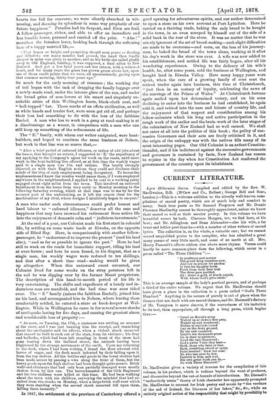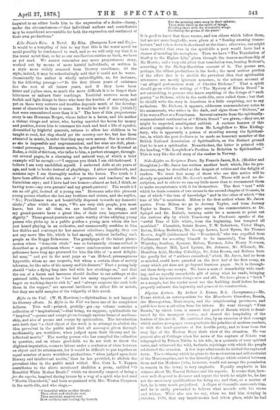CURRENT LITERATURE.
Lyra Hibernica Sacra. Compiled and edited by the Rev. W. Macllwaine, D.D. (M'Caw and Co., Belfast ; George Bell and Sans,. London.)—This is a welcome addition to the already well-known com- pilations of sacred poetry, which are of much help and comfort to- many. Such true poets as Sir Samuel Ferguson and Mr. Dennis. Florence MacCarthy cannot be thoroughly appreciated, unless we know their sacred as well as their secular poetry. In this volume we have beautiful verses by both. Clarence Mangan, too, we find here, at his best ; and Mr. Allingham and Dean Alexander—also his wife, a far truer and loftier poet than he—with a number of other writers of sacred lyrics. The collection is, on the whole, a valuable one ; but we cannot accord unqualified praise to the compiler, who has admitted a great many poems of very little merit, and some of no merit at all. Mrs. Henry Faussett's efforts seldom rise above mere rhyme. Verses could hardly be more common-place than the following, which occur in a poem called "The Three Children ":- in penitence and sorrow
The proud Bing trembles now, And low in prayer for pardon Is bent his haughty brow.
Forth from their fiery trial
The three pass purified, Ah ! theirs is gold, of worth untold, With whom God's gifts abide."
This is an average sample of the lady's poetical powers, and of perhaps a third of the entire volume. We regret that Dr. Macllwaine should have given a place in the collection to a poem called "God's Throe Hundred." Anything in the nature of parody is out of place when the themes that are dealt with are sacred themes, and Dr. Maunsell's flattery of Mr. Tennyson is more sincere, if the correctness of his imitation be its test, than appropriate, all through a long poem, which begins. thus:—
"Israel on Moreh's steep Waked up at dawn's first peep, Waked up and wondered; 311dian in myriads round Lay on the dewy ground, By the vale sundered. Israel's ten thousands press On In their mightiness; Loud the vale thundered; God's awful Voice they hear- • Back, those who faint or fear, Back, trembling sword or spear, Faint-hearted! draw not near.' He who can save by few, Faithful to Him, and true, His own great work can do,— Do with Three Hundred!"
Dr. Macllwaine gives a variety of reasons for the compilation of this volume, in his preface, which is tedious beyond the wont of prefaces, and discursive beyond the out-of-bounds of introductions. Mr. Disraeli's "melancholy ocean" theory of Irish character has apparently prompted Dr. Macllwaine to account for Irish poetry and music by," the verdure of the sod of Ireland, the blueness of her lakes," &c., &c., while an entirely original notion 'at the_reaponsibility that might bypossibility be
imputed to an editor leads him to the expression of a desire—funny, under the circumstances—" that individual authors and contributors easy be considered accountable for both the expression and sentiment of their own productions."



































 Previous page
Previous page